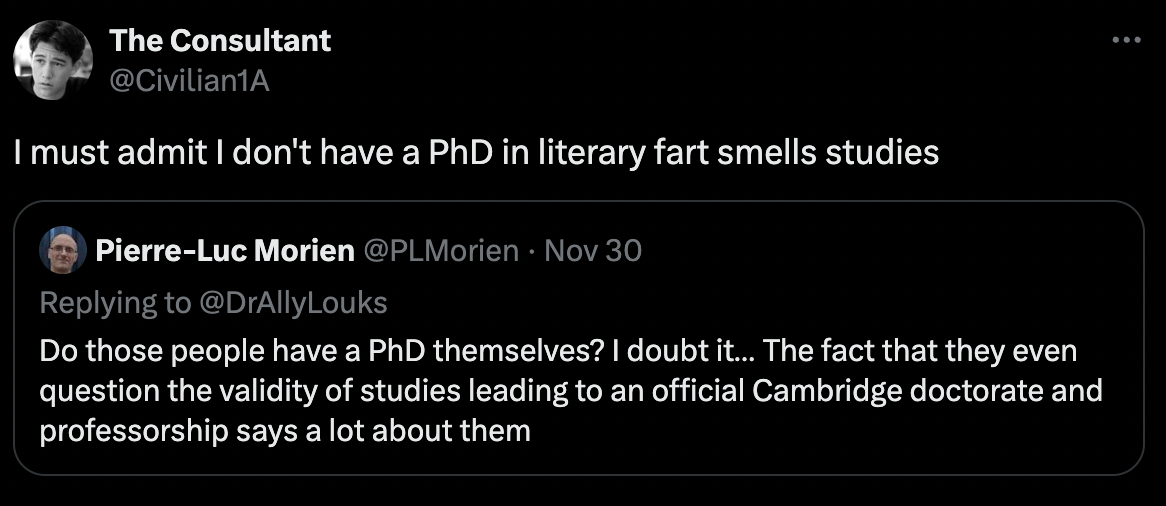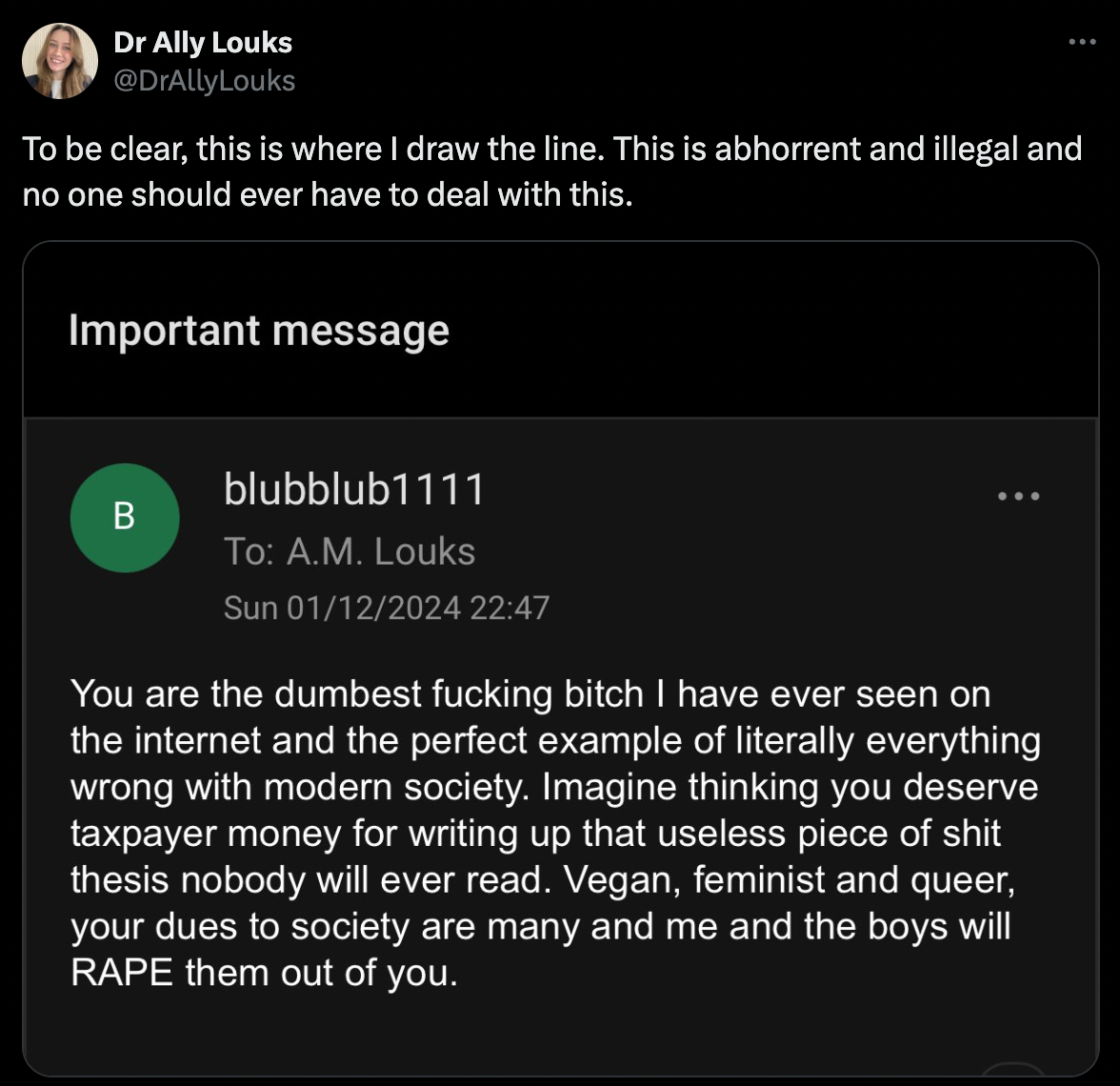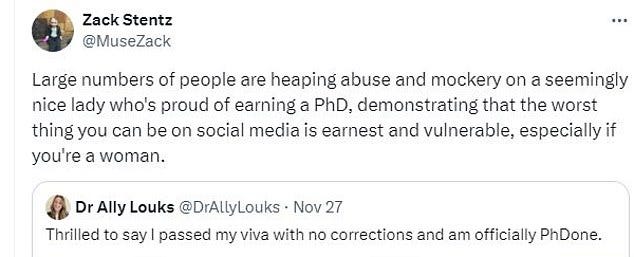When Dr. Ally Louks took to X last Thursday to celebrate completing her PhD, Olfactory Ethics: The Politics of Smell in Modern and Contemporary Prose, she did not expect the post to go viral due to mostly right-wing men attacking her online. Her post gained over 90 million views and 11’000 comments in six days, many in response to the hate she was receiving. The online harassment she faced is not just negativity towards her research but highlights a broader and disturbing trend of misogyny and anti-intellectualism directed at women in academia.
PhDs are niche, representing years of hyper-focused research, which is then presented for evaluation by a small panel of experts. They are rarely written for the wider public; therefore, they may not make a lot of sense to those outside of the specific academic circle. Achieving a PhD is a huge accomplishment, regardless of the topic it is in, and they always contribute something new to their field. Dr. Louks’ PhD explores how the language and imagination of smell can influence social structures, such as gender, class, and race. Her work explores the intersections of identity and sensory experience. Yet, her research has been mocked as “fart studies” by X users who are reducing her work to a terrible punchline.

This online treatment is part of a broader pattern where female scholars face continuous challenges and have to continuously defend their work. The bullying, often veiled as humour or critique, only serves to undermine the intellectual contributions of women.
Much of the criticism directed at Dr. Louks has had little to do with her research. Instead, the abuse has targeted her directly. Users on X attacked her age, appearance, and personal choices. In now-deleted posts, men accused her of “failing her bloodline” by choosing education over traditional roles like motherhood and wished for the return of “witch hunts.” This attack on her life choices is a common theme when looking into misogyny towards female academics. A study by SCDAI highlights how women in academia feel pressured to “tone down” their femininity or adopt more masculine behaviours to be taken seriously, and even if the femininity is toned down, women are then attacked for not being matronly enough or subjected to homophobic abuse.

This online violence reflects the hostility women face when occupying spaces traditionally dominated by men. For women in academia, this abuse is heightened by the internet. Studies show that women are disproportionately subjected to harassment online, with female academics and activists facing higher rates of threats and abuse than their male counterparts. Dr. Louks’ experience shows how quickly online harassment can become a silencing tool. Additionally, women are more likely to feel the emotional impact of online harassment, with 35% of women describing their most recent experience as “extremely” or “very” upsetting. This is unfortunately not surprising—death threats and rape threats are extremely unsettling for anyone, and currently, when femicide is a rising issue in the UK, the threats need to be taken seriously. In 2023, a report by the UK’s House of Commons Women and Equalities Committee showed that women, especially those in public life or academia, face significant harassment, including misogynistic abuse, with right-wing populist groups often leading the charge.

Another study, in 2020, by the UK’s National Union of Students (NUS) found that 60% of female students and staff in higher education had experienced some form of gendered abuse, while more than a quarter of these incidents involved sexual harassment. This is then further heightened by the access to unregulated social media. Right-wing populism, in particular, on social media platforms constantly attacks women’s voices. These populist movements portray women who challenge gender roles or politics as a threat to societal norms, often resorting to threats, and call for “returning” to more conservative values. This type of environment not only silences women but also nurtures a culture where intellectualism is seen as suspect if it doesn’t align with populist agendas or includes the slightest bit of what right-wingers classify as ‘wokeness’.

When academic work by women is met with violence and abuse, fewer women will then enter academia altogether or feel able to use their voices. The loss of these voices, outlooks and opinions would set society back on a huge scale and deprive us of critical insights and perspectives. Dr Louks’ resilience on X is amazing to witness; she has refused to turn off comments and has spoken directly to the trolls herself, but this should not be necessary. She has already defended and gained her PhD; why should she need to defend it again to an army of angry-for-nothing X users? Social media platforms must address the unchecked misogyny and abuse that thrives, allowing dangerous rhetoric to gain traction with young users who do not know better. Society as a whole must also do better with recognising the deeply rooted biases that uphold misogyny and getting rid of the idea that academic contributions are only valuable when directly upholding a right-leaning capitalist society.
The harassment faced by Dr. Louks is a reminder of the constant challenges women continue to face. It highlights the devaluation of female intellectual efforts and the ease with which misogyny and violence are weaponized to silence women online.
By supporting women like Dr. Louks, we support the right to a free and fair education. Right-wing politics often relies on oversimplified explanations and scapegoating, appealing to emotions over facts. Staying educated and continually learning are great ways to fight against the misinformation that right-wing X users are pushing out. On a brighter note, the support Dr Louks has received following the online hate campaign has begun to outweigh the trolls and shows that the loudest opinions are not always the right opinions.














The reactions to her posting have been over-analyzed. They reflect nothing more than what is now the Twitter/X environment of hostile, conspiracy and hate spewing extremism and anti-intellectualism of the right, which has found a safe place and been emboldened thanks to its new owner. There would have been si ple “congrats” on Bluesky.
There’s nothing intellectual about this bs. Academia is infested with talking heads masquerading as intellectuals and they should be called out. Go back to GroomerSky and enjoy your echo chamber.